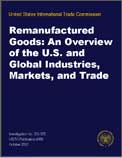
USITC Publication 4356
Investigation No. 332-525
Summary
The United States is the world's largest producer, consumer, and exporter of remanufactured goods, reports the U.S. International Trade Commission (USITC) in its latest publication.
Remanufacturing is an important and growing activity in many industrial sectors and supports at least 180,000 jobs throughout the United States, according to the report. Remanufacturing is the industrial process of restoring end-of-life goods to original working condition.
Completed for the U.S. Trade Representative, the report provides an overview of the U.S. remanufactured goods industries and markets, including U.S. remanufacturing production and employment, estimates U.S. and global trade in remanufactured goods, and examines factors affecting trends in remanufactured goods trade.
The USITC found that:
- During the period 2009-11, U.S. production of remanufactured goods grew by 15 percent to at least $43 billion, supporting 180,000 full-time jobs. The largest U.S. remanufacturing sectors are aerospace, heavy-duty and off-road equipment, and motor vehicle parts.
- U.S. production, employment, and exports are growing in many remanufacturing sectors but are still small compared with overall U.S. manufacturing activities.
- U.S. exports of remanufactured goods total $11.7 billion in 2011, up 50 percent compared with 2009. Canada, the European Union, and Mexico are important markets for U.S. exports of remanufactured goods. About 40 percent of U.S. remanufactured goods exports went to free trade agreement partners.
- Key factors affecting the competitiveness of U.S. remanufacturers in all sectors and markets are the availability and relative price of cores (the used goods to be remanufactured), transportation and labor costs, the comparative price of remanufactured goods and new goods, the availability of lower-priced new alternatives, and customer perceptions about price and quality.
- Remanufacturing and trade in remanufactured goods and related inputs in foreign markets are limited. Foreign regulatory barriers are a significant impediment to U.S. and global trade in remanufactured goods. The lack of a common definition of remanufactured goods hampers increased U.S. and global trade in remanufactured goods.
- The United States and the European Union account for the bulk of global remanufacturing activity and trade. Although Brazil, India, and China are developing their own remanufacturing industries in response to growing domestic demand, they tend to restrict trade in remanufactured goods and related inputs the most.
View the publication at: http://www.usitc.gov/publications/332/pub4356.pdf


















